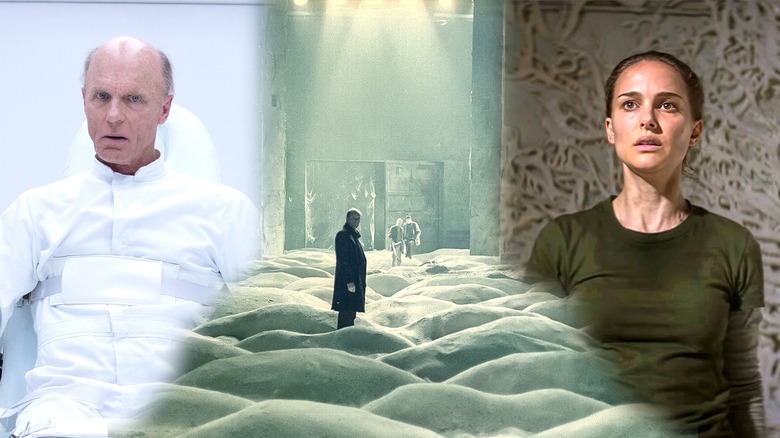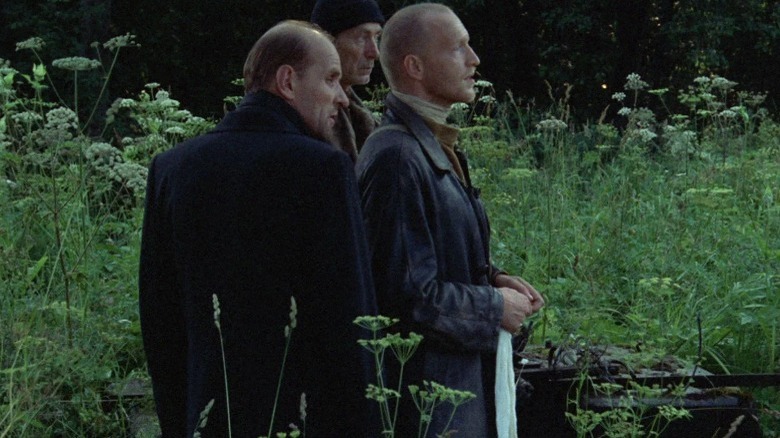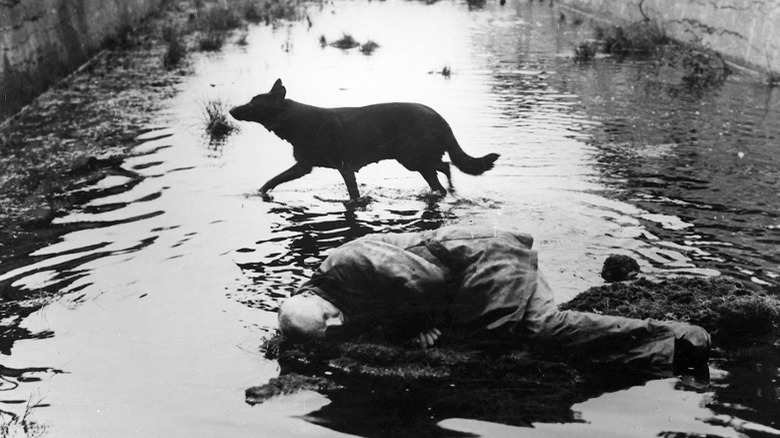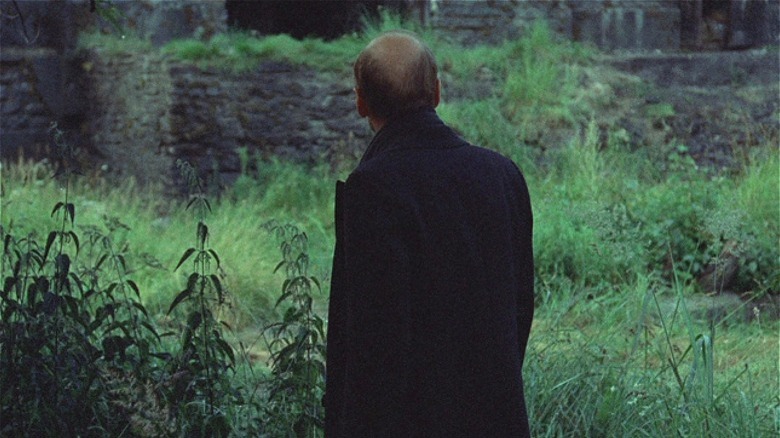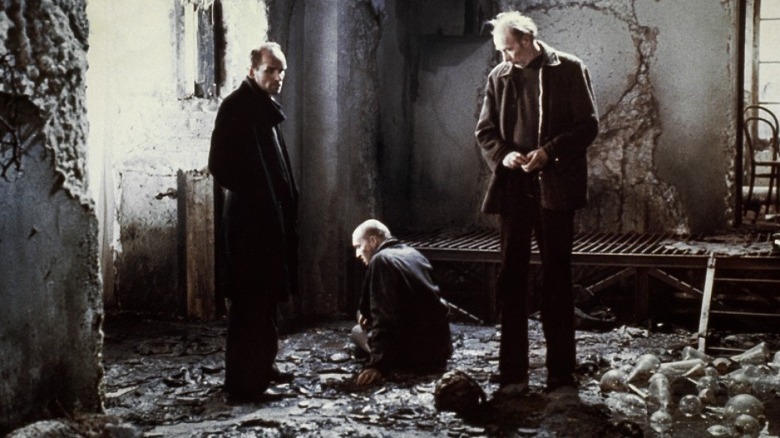From Westworld To Annihilation, No Sci-Fi Movie Is More Influential Than Andrei Tarkovsky's Stalker
The premise of Soviet filmmaker Andrei Tarkovsky's magnum opus, "Stalker," seems deceptively simple. The titular stalker (Alexander Kaidanovsky) must guide two men, The Writer (Anatoly Solonitsyn) and The Professor (Nikolai Grinko), to and from The Zone, a mystical no man's land whose ruins remain shrouded in secrecy. Men who venture into The Zone have never returned, with the exception of the Stalker, who has made this dangerous foray into the unknown his sole source of income. The aim is to guide passengers to The Room, a space within the Zone that can make anyone's wishes come true. But do we know what we truly desire? What if our deepest urges betray our perception of who we think we are? This is one of many, many questions "Stalker" seems to pose.
What Tarkovsky manages to do with "Stalker" is astounding — he invests a rather straightforward premise with layers of thematic richness that feel like a labyrinth of co-existing philosophies, interpretations, and meaning-making. Rarely has a sci-fi film been so hyperaware of the rot at the core of its baffling premise, and succeeded in offering a terrifying, yet hopeful dystopian tale about the futility of human desires. The hold that "Stalker" has on contemporary sci-fi is obvious, yet seldom acknowledged, as everyone from Lars von Trier to Alex Garland has paid homage to "Stalker" in some shape or form.
"Stalker" can be interpreted as a political or religious allegory, a conflict between one's artistic and pragmatic selves, an existential manifesto, or all of the above. The more layers the film sheds, the deeper the lore is revealed to be. Let's talk about the complicated, unprecedented legacy of "Stalker," a film that pushed Tarkovsky to his limits in a way that mirrors the haunting bleakness that seeps through every frame in the film.
A risk-laden, treacherous journey
To be a stalker in Tarkovsky's world is the ultimate act of self-effacement. Stalkers constantly skirt the edges of legality and deliberately make their way into a space that is off-limits to anyone, and to do so, one has to completely empty themselves of their personal goals, dreams, and desires. The men he must guide, in this case, The Writer and The Professor, hardly understand the space that they desperately think will fulfill their wishes, as they approach this pilgrimage according to their respective, often restrictive, worldviews.
By the end, when the three reach the heart of the Zone, they expose their own hearts, revealing their innermost desires, irrespective of how utterly shameful or disturbing they might be. No matter how many masks one slips on, the Zone finds a way to lay one's soul bare, forcing men who dare to venture into this space to be perceived.
In a heartbreaking instance of life imitating art, Tarkovsky's own journey towards the completion of "Stalker" was as dangerous and risk-laden as the pilgrimage in the film. After he began working on "Stalker" in 1976, various issues plagued the project — ruined negatives of exterior shots set production back, the film's cinematographer had to be abruptly replaced due to personal conflicts, and Tarkovsky suffered a cardiac arrest two years later, which further delayed the film's release. Moreover, the film's principal photography, which was supposed to be done in Tajikistan, was later moved to Estonia on account of an earthquake, and the film's crew had to relocate near a hydroelectric power plant that spewed toxic waste, making several crew members sick.
These intense behind-the-scenes struggles are reflected in the philosophies that "Stalker" holds up, but instead of hampering the quality of the film, they only serve to intensify its beauty and terror.
The quietest place in the world
No monstrous entities lurk through the lush green meadows of the Zone, and nor do its sand dunes hide any mythical beasts. The threat in "Stalker" comes from within, as it directly transports its characters (and its viewers) into a world that not only defies the laws of physics but is also beyond human comprehension. As the three men journey deeper into the ruins, they bicker more than ever, eager to reshape the world as they deem fit. While The Professor takes on a hyper-skeptical, pragmatic view of The Room, The Writer remains embroiled in his love for art and navigates the space with sensitivity. As for the Stalker, he feels at home for the first time, laying down on a bed of warm grass and hugging himself in an almost spiritual relief.
As the Stalker reiterates at several points, the Zone demands respect, with silence being one of its many traps that strip its inhabitants of falsehoods. The wishing room that serves as the catalyst for the film's events is a reminder of the futility of desires, as it is impossible to pin down what or who we truly need and want to be. Once we achieve something beyond our reach, our expectations do not end there — they shift, mutate, and deepen the void of dissatisfaction that plagues even the best of us.
Moreover, the Zone is pointedly haunting for a reason: The landscape is a mixture of almost-alien beauty and the charm of mundane human objects, such as books and trinkets submerged underwater while being surrounded by toxic waste. Tarkovsky might or might not be making allusions to chemical warfare or environmental degradation, but it is impossible to gloss over the powerful prescience that "Stalker" embodies, shaping numerous sci-fi offerings to come.
The influence and legacy of Stalker remains unparalleled
It is fairly common knowledge that Ingmar Bergman regarded Tarkovsky as one of the greatest filmmakers of his generation, and the two directors shared philosophical sensibilities, as evidenced by the sonic overlaps between "Winter Light" and "The Sacrifice." The influence of "Stalker," however, is not limited to Tarkovsky's immediate peers — pioneers of the New Russian Cinema movement, such as Aleksandr Sokurov, borrowed heavily from the Soviet filmmaker and were heavily influenced by his outlook on the human condition.
Tarkovsky approaches core human impulses with great nuance while emphasizing the importance of memory and nostalgia, which directly influence the kind of people we want to be. Some cycles are perennial and ouroboros-like, such as the Stalker's constant suffering and mental imprisonment, which he can only shed off in a plane of existence removed from his own.
The Zone, once a one-of-a-kind, Tarkovskian landscape, has been replicated in numerous films and pieces of media, from Chris Marker's "Sans Soleil" to Jonathan Nolan and Lisa Joy's TV show "Westworld." Perhaps no work takes more obvious influence from "Stalker" than Alex Garland's "Annihilation," which takes place in a similar treacherous setting dubbed the Shimmer — a highly-saturated and dreamlike space much like Tarkovsky's Zone, birthing mutations and rogue versions of oneself within a mystical vacuum. As in "Stalker," the revelations in Garland's film are deeply personal and universal all at once, where the truth resides not in revealing dialogue but in wordless details that paint a vivid picture of a reality that directly challenges our own.
The film's visual language warrants a deep dive in its own right, as its beauty is not merely skin deep. It furthers the filmmaker's vision, informing the themes embedded into the narrative and conveying emotional vignettes that tint the synesthetic experience that is "Stalker."
An open heart leads to essential truths
The wealth of interpretations that "Stalker" accommodates eventually mesh into one another, forming an interconnected web of theories/philosophies that form a cohesive whole. While "Stalker" is bound to resonate differently with different folks, the heart of the film seems to posit a war between hardened rationality and emotional openness. The Professor, who wishes to destroy the Zone lest it falls into the wrong hands, represents the extreme (albeit realistic) worldview that humanity is capable of abominable things, including sullying a pure, untouched space like The Room. Greed and ambition know no bounds, and they can be core motivators for people to step into The Room and manifest desires that can threaten humanity itself.
On the other hand, The Writer and the Stalker are more open to hope, although they view the world in distinct ways. The Writer, who is essentially an artist, has grown disillusioned with the world and questions his worth after being endlessly criticized by those around him. What he wants from The Room seems to be creative inspiration, but even this epiphany is plagued with doubts, as he ponders whether art holds true meaning without adoration or accolades. To write, to create is to suffer, he muses, as he grapples with faith and spiritual queries that haunt the core of his being.
The Stalker, neither artistic nor pragmatic, emerges as the most spiritually profound of them all. He desperately needs people to believe in the power of the Zone, as it grants him a purpose to keep going. When both men fail, he laments, but the ending affirms that there is still hope, as a new generation will have the ability to bridge the gap between this world and the next with psychic abilities beyond imagination. May everything come true.
